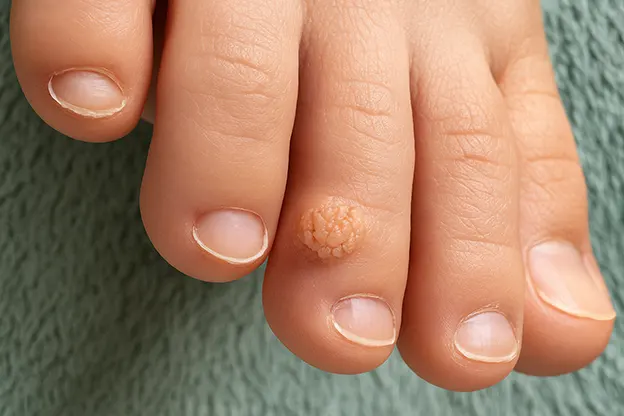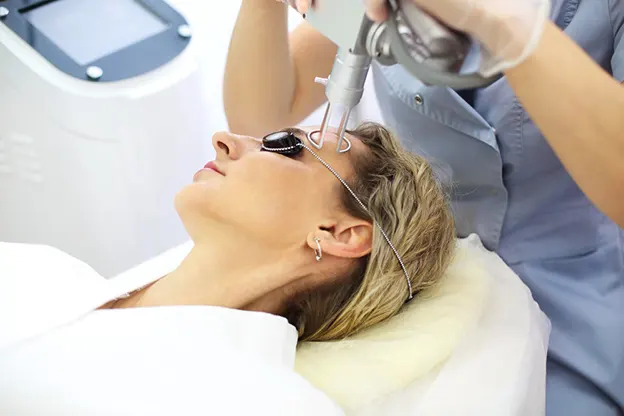Surgical Dermatology
Cutting-Edge Techniques For Skin Surgery
Disease-Related Conditions
Surgical dermatology can help manage a vast number of skin health issues, including the following:
- Infections, such as warts, stubborn boils, and abscesses that need to be drained.
- Inflammatory conditions like painful lumps in the armpits or groin (hidradenitis suppurativa).
- Mixed causes, including non-healing wounds, foot sores from diabetes or poor blood flow, large acne lesions, and skin thickening from rosacea.
- Skin growths at high risk of becoming cancerous, such as actinic keratosis (sun-damaged patches and lumps) and unusual moles.
- Skin cancers, including squamous cell carcinoma, basal cell skin cancer, and melanoma.
Besides treating diseases, minor procedures such as biopsies may also help detect skin disorders.

Foot Wart
Aesthetic Skin Problems
Surgical dermatology can also help improve cosmetic skin issues, such as the following:
- Superficial skin changes, including fine lines, wrinkles, uneven tone or texture, and shallow scars.
- Connective tissue conditions, such as skin tags, stretch marks, deep or tight scars, and loose skin.
- Hair and scalp concerns, like thinning hair or bald spots that may be treated with hair restoration procedures.
- Pigmented blemishes, including common moles, age spots, melasma, and some birthmarks.
- Areas with visible blood vessels, such as spider veins and broken capillaries.
But it can be challenging to tell whether a skin lesion is harmless or potentially concerning on your own. That’s why you need a consultant dermatologist, who will take your medical history along with a careful examination to make an accurate assessment.

Mole Removal
Ways Surgical Dermatology Can Improve Your Skin
Our Liverpool and Chester clinics deliver personalised skin care and treatment, combining medical expertise with the latest surgical techniques. Our services include the following in-office procedures:
- Simple excision: The doctor removes a small area of skin using a scalpel, and the edges are brought together using stitches. This method is often used for common moles, skin tags, and various skin cancers.
- Punch biopsy or excision: A small, circular tool is used to take out a core of skin for testing or treatment. This procedure is commonly performed for unusual moles or small lesions suspicious for skin cancer.
- Shave excision: The top layer of the skin lump is shaved off with a blade. This treatment is typically used for raised moles, warts, and slow-growing cancers.
- Dermabrasion: A rotating device gently sands the top layers of skin to smooth roughness or irregularities. This technique is commonly used for acne scars and fine wrinkles.

Mole Removal
- Curettage and cautery: The lesion is scooped out, and the area is sealed with heat to prevent bleeding. This procedure is typically used for warts, benign growths, and slow-growing skin tumours.
- Cryosurgery: The dermatologist treats the site with liquid nitrogen to freeze and destroy aberrant skin cells. This treatment is commonly used for warts, skin tags, and small benign growths.
- Radiofrequency ablation: Radio waves are passed onto the skin to target and remove abnormal tissue. This technique can safely get rid of benign lesions and stubborn warts.
- Laser therapy: Focused light beams called “lasers” are used to take off, reshape, or improve the appearance of skin tissue. This versatile procedure can address various skin conditions, including wrinkles, actinic keratosis, flat moles, scars, tattoos, skin tags, signs of rosacea, and unwanted hair.
These procedures are typically performed at our Liverpool or Chester clinic in a single visit using injectable pain medication (local anaesthetic) for comfort, so downtime is minimal. With Dr Thiru’s decades of experience in surgical dermatology, you can be assured that your skin condition will be managed with the highest standards of care.

Skin Tag Removal by Radiofrequency Ablation

Skin Examination With a Dermatoscope

Actinic Keratosis Treatment with Cryotherapy
Frequently Asked Questions
Here are some frequently asked questions about surgical dermatology in Liverpool:
If you have more dermatology related questions, our full patient questions page covers treatments, aftercare, safety, and recovery in detail.

